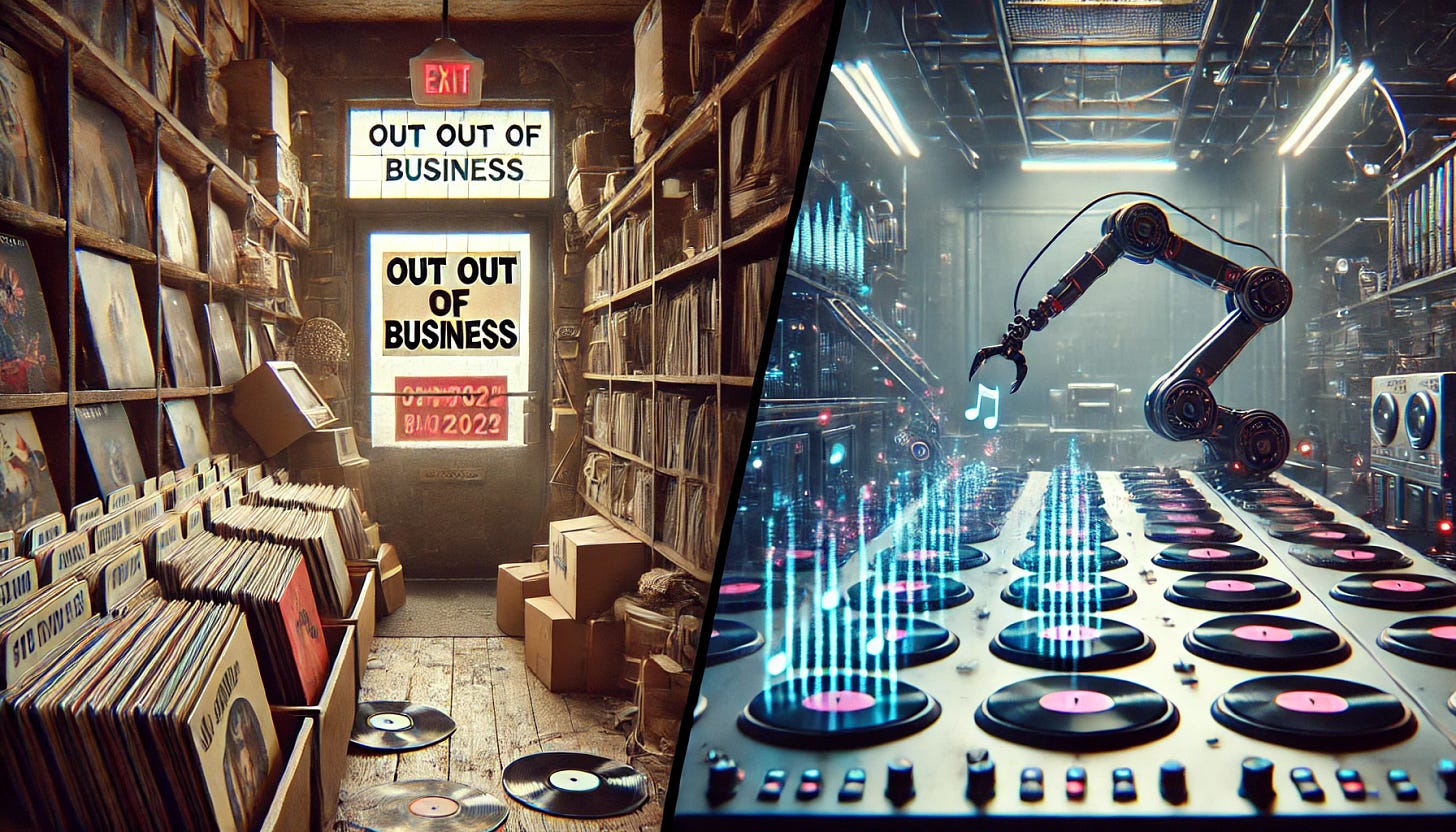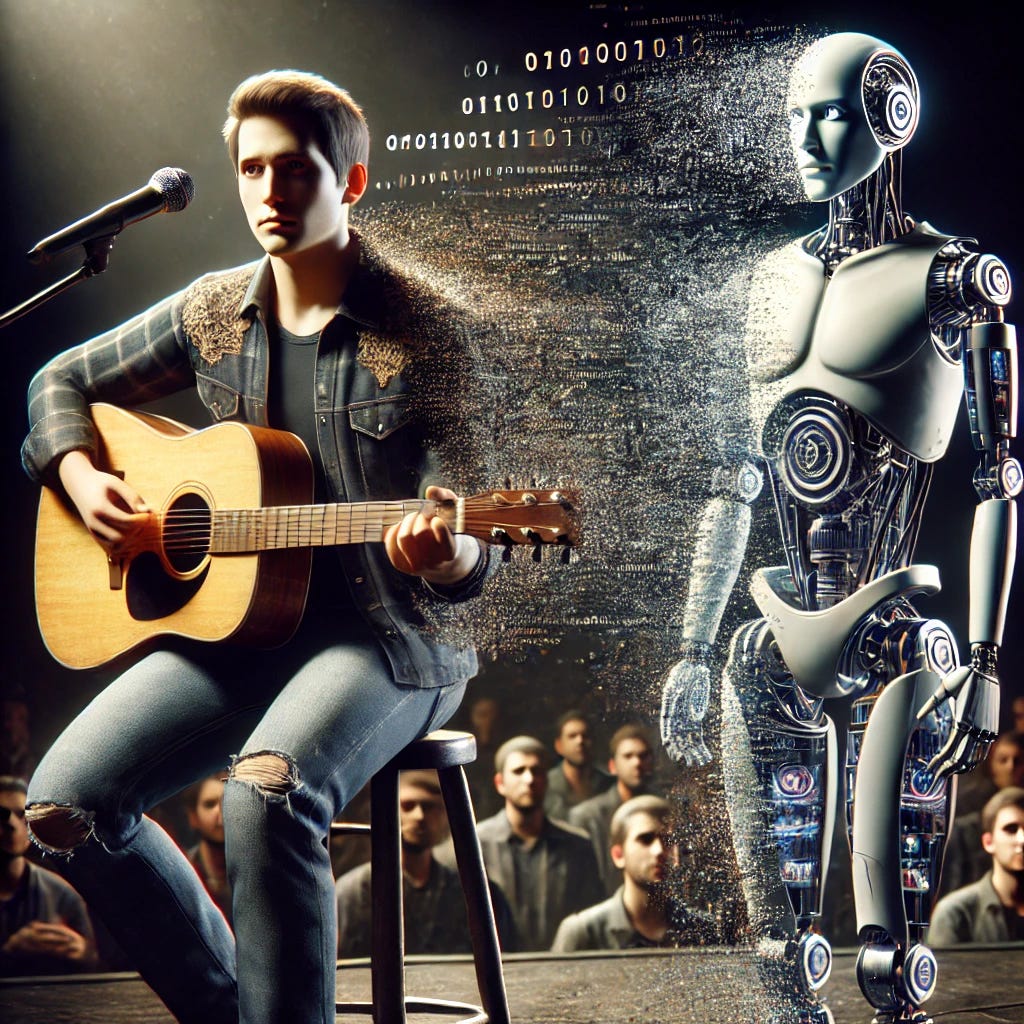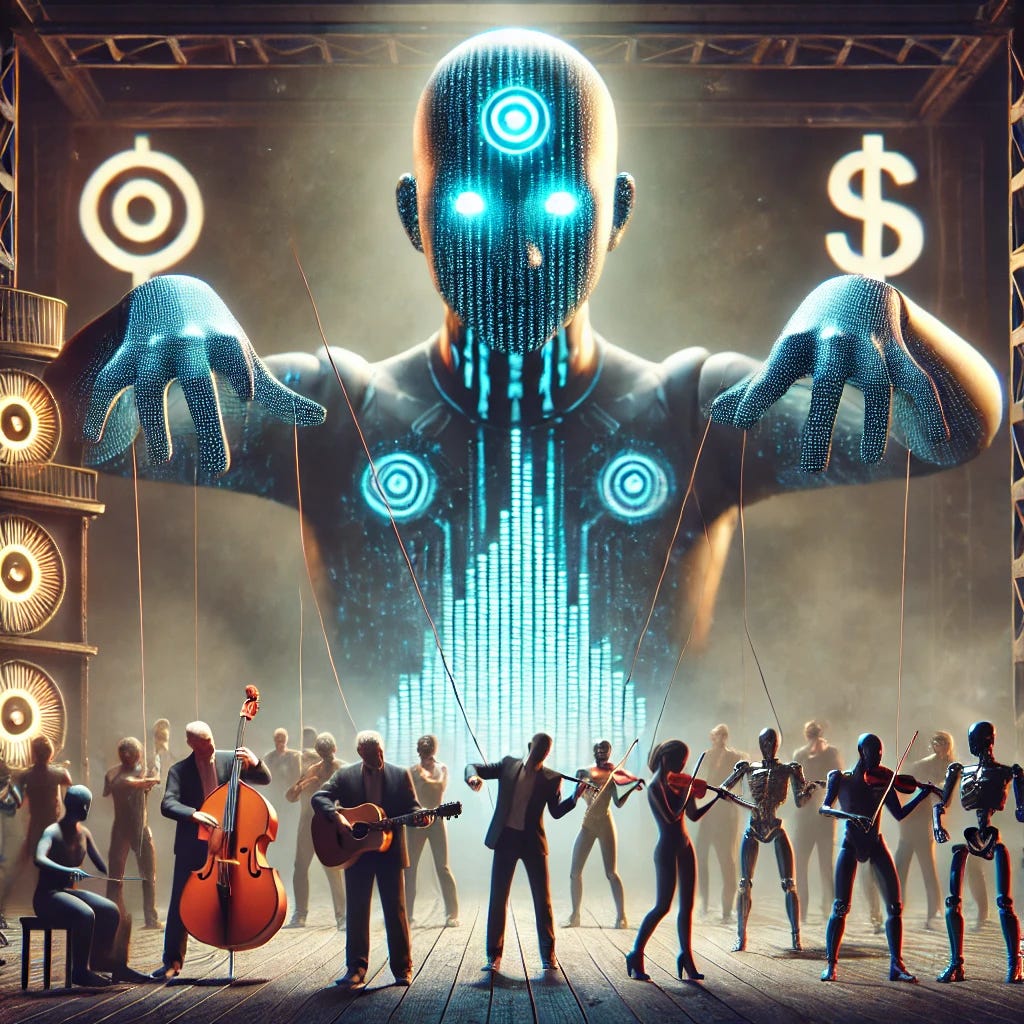The End of Music as We Know It: The Hidden Cost of Streaming 2.0
Superfan Subscriptions & Increased Royalties? Don’t Be Fooled—This Deal Could Make Music Pricier and More Exclusive Than Ever.
Spotify and Universal Music Group (UMG) claim "Streaming 2.0" is a step toward a fairer streaming economy. But behind the marketing, this deal isn’t about improving music—it’s about maximizing profits through viral trends, algorithmic control, and superfans footing the bill.
What This Means for Music
🔹 Music for Memes, Not Emotion – Songs will be crafted for 10-second virality, not depth or longevity. Memes over melodies.
🔹 Indie Artists Get Buried – If a song isn’t engineered for trends, it won’t be heard. Major-label content will dominate even more.
🔹 Superfans Pay More, Labels Profit More – A new “super-premium” tier will charge superfans for perks, but revenue still flows to major labels, not artists.
🔹 AI-Generated Music Takes Over – Streaming will favor AI-made, engagement-driven songs over real musicianship, turning music into background noise.
Increased Royalties? Not for Most Artists
Spotify and UMG promise better royalties, but:
✔ No clear details on how payouts will actually increase.
✔ Major labels still control the revenue flow.
✔ Past platform changes have already lowered songwriter royalties.
At its core, this deal isn’t about fixing streaming—it’s about reinforcing corporate dominance. If these trends continue, music will become less about artistry and more about engagement metrics, paywalls, and algorithms.
The question isn’t whether music will survive—it’s whether it will still matter.
Streaming 2.0: When Music Becomes a Joke
Spotify and UMG’s Streaming 2.0 isn’t just reshaping how we listen to music—it’s reshaping music itself. The rise of short-form content, algorithm-driven virality, and humor-based trends has transformed the way music is made, marketed, and consumed. But at what cost?
Instead of fostering artistic innovation, this system rewards songs that function as punchlines, background noise, or quick dopamine hits. Music is no longer valued for its depth or cultural significance—it’s being reduced to a gimmick, optimized for engagement rather than artistry. And with AI now entering the equation, even human creativity itself is at risk of being phased out.
A System Built for Engagement, Not Art
Music used to be about expression, storytelling, and cultural significance. Today, algorithms determine success—not talent, vision, or originality.
Streaming platforms prioritize what makes people scroll, not what makes music meaningful.
Short-form video platforms like TikTok, Reels, and YouTube Shorts have conditioned audiences to engage with music in seconds-long bursts. Spotify and UMG, rather than resisting this shift, are now building a system that doubles down on engagement-driven content at the expense of artistry.
How It Works
Music as a Meme – Songs are no longer made to stand alone; they exist to serve a viral challenge, a dance trend, or a comedic skit. If it doesn’t fit, it gets buried by the algorithm.
Disposable Hits – The lifespan of a song has collapsed. What trends today disappears tomorrow, not because audiences move on naturally, but because the algorithm decides when it’s time for something new.
Independent Artists Sidelined – If your music isn’t funny, memeable, or algorithm-friendly, good luck getting heard. Streaming platforms actively suppress independent artists in favor of major-label-backed viral trends.
The result? A music industry where success is dictated by engagement metrics, not artistic merit.
Who Really Benefits? (Hint: Not Artists)
Streaming 2.0 isn’t about helping artists or improving the listener experience—it’s about reinforcing major labels’ dominance. By strengthening AI-curated playlists, engagement-first algorithms, and monetized superfandom models, it creates a pay-to-win system where corporations win and musicians lose.
UMG’s expansion into emerging markets follows the same pattern. While framed as a strategy to give more artists global exposure, it’s really about securing cheaper talent before they demand fair pay. Labels lock in control early, paying less for new acts while continuing to profit from their legacy catalogs. For American and European artists, this shift offers little benefit and shrinks opportunities as resources are redirected to more “cost-effective” markets.
Meanwhile, AI-generated music is gaining traction—and Streaming 2.0 positions major labels to capitalize on that shift. These algorithm-friendly, royalty-free tracks can flood playlists, pushing out real artists while maximizing profits for labels and streaming platforms.
The Future of Music: A Controlled Feedback Loop
If these trends continue, music won’t be created for people—it will be created for the algorithm.
Songs will be optimized for virality, not creativity.
Artists will be forced to become content creators first, musicians second.
AI will replace human expression, generating "hits" tailored for engagement but lacking depth.
Music, once a powerful form of storytelling, cultural reflection, and emotional connection, will be reduced to background noise for the next trend.
Streaming was supposed to democratize music.
Instead, it’s becoming a closed-loop system, reinforcing corporate interests while limiting artistic diversity. If we don’t push back, music as an art form will become a fleeting punchline—one that nobody remembers when the next trend rolls in.
What Needs to Change: A Call for Real Reform in Music Streaming
The UMG-Spotify “Streaming 2.0” deal is a reminder that the music industry’s biggest players will always prioritize profit over progress. But there are still ways to push back and demand a fairer system:
🔹 Support Independent Artists Directly – Streaming services are designed to limit your choices, pushing corporate-backed music while burying independent voices. Break the cycle by buying music directly from artists, attending shows, and using platforms like Bandcamp that prioritize fair payouts.
🔹 Demand Transparency from Streaming Services – The industry hides behind complicated payout models and vague “royalty increases” that primarily benefit major labels. Push for clear disclosures on how royalties are distributed and how algorithms decide what gets heard.
🔹 Advocate for Fair Royalty Reform – The current system funnels money to the biggest players, regardless of actual listening habits. Support user-centric payout models that compensate artists based on who you actually listen to—not corporate deals.
🔹 Reject AI-Driven Content Dominance – As AI-generated music floods streaming services, real artists risk being replaced by algorithm-friendly, mass-produced tracks. Demand policies that prioritize human artistry over synthetic, profit-driven content.
The complexity of streaming isn’t accidental—it’s a tool for gatekeeping power, suppressing competition, and ensuring labels extract maximum profit. The only way to change the system is to see through the confusion, demand better, and take action where it counts.
Streaming 2.0: Expansion or Exploitation?
Universal Music Group (UMG) is promoting Streaming 2.0 as the next evolution in music streaming, emphasizing global expansion, premium subscriptions, and artist-centric models. But is this about creating opportunities for musicians—or just securing cheaper talent before they gain bargaining power?
Like corporations that outsource labor to cut costs, major labels have a history of underpaying artists in emerging markets. UMG’s focus on China, Brazil, and Mexico is framed as expansion, but it also allows them to sign talent at lower rates, locking artists into contracts before they gain leverage.
For global artists, this may seem like an opportunity—until success doesn’t translate into fair pay. For U.S. and European artists, it means fewer resources and increased competition, as labels prioritize cheaper talent while continuing to profit from legacy catalogs.
Do We Actually Love UMG’s Old Catalog—Or Do We Have No Choice?
The Spotify-UMG deal reinforces another trend: labels pushing old music over new releases because it’s the safest bet for corporate profits.
Streaming algorithms don’t reflect our tastes—they create them.
We hear the same songs not because they’re the best, but because they’re the most profitable to promote.
Meanwhile, emerging and independent artists struggle for visibility, buried under a system designed to recycle the past rather than invest in the future. If we don’t push back, streaming will become a closed-loop system—one where discovery is controlled, nostalgia is manufactured, and real artistry is sidelined in favor of profit.
Contact the DOJ, FTC & Your Lawmakers—Demand an Investigation into Streaming Abuses
The U.S. Department of Justice (DOJ) and the Federal Trade Commission (FTC) have the authority to investigate anti-competitive practices, monopolistic control, and unfair business models that harm independent musicians, consumers, and the broader music industry. The growing concentration of power in major streaming services, record labels, and financial institutions backing these entities (such as BlackRock and Vanguard) raises serious concerns about market manipulation, royalty suppression, and algorithmic bias that stifles competition.
This issue has national economic and cultural implications, affecting not only artists but also consumer choice, fair market competition, and the future of the music industry. We are urging regulators to immediately investigate Spotify, major labels, and their financial backers for potential antitrust violations, deceptive business practices, and anti-competitive behavior.
🚨 Take Action Now! 🚨
1️⃣ Contact the DOJ Antitrust Division:
📞 Call: (202) 514-2000
📩 Email: antitrust.complaints@usdoj.gov
💻 Submit an online complaint: https://www.justice.gov/atr/citizen-complaint-center
2️⃣ File a Complaint with the FTC:
📞 Call: (202) 326-2222
💻 File an online complaint: https://reportfraud.ftc.gov/
3️⃣ Contact Your Lawmakers & Demand Legislative Oversight
Find your representatives and senators at www.congress.gov/members
📩 Suggested Message:
"I am urging you to investigate monopolistic abuses in the music streaming industry. The DOJ and FTC must examine whether Spotify and major labels are engaging in unfair competition, suppressing independent artists, and manipulating algorithms to benefit corporate-backed content. This harms economic fairness, cultural diversity, and consumer choice. We need urgent legislative oversight to enforce transparency and fair compensation for artists."
📢 Every Call, Email & Complaint Matters! Help break the cycle of exploitation in the music industry. Share this with fellow artists, advocates, and policymakers to demand action.








